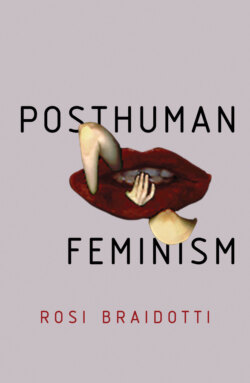Читать книгу Posthuman Feminism - Rosi Braidotti - Страница 25
Conclusion
ОглавлениеPosthuman feminism is an intervention upon the legacy of neoliberal and socialist feminisms as well as on the transhumanist delusion. A posthuman turn is needed as a corrective and alternative to the intersecting critiques of power. I see feminism as repositioning the mixed legacy of humanism in a profoundly different historical context from that which generated it. Feminism today needs to be a transformative, not just an egalitarian movement. I concur with Iris van der Tuin that ‘feminism is the struggle against sexism, homophobia, transphobia and other intersecting forms of structural power imbalances based on naturalizations of inequality’ (van der Tuin, 2015: xiii). As such, not only is it more necessary than ever, but I also think activists should keep some critical distance from the very institutions they have gained the right to enter, occupy and sometimes even run. How can one still cultivate the world-changing passions of feminism, while ensuring the gradual success of its reforms? Where are the radical forces today?
The feminist posthuman answer is multi-layered. In addition to criticizing the social injustices implied in the neoliberal position, and thus striking an alliance with the traditional socialist feminist politics, it also deepens the analysis of advanced capitalism and its concomitant technoscience and bio-genetic technologies. Posthuman feminism revives the radical tradition by offering an updated analysis of cognitive capitalism, based on the study of its advanced technologies, while situating these advances within the ecological crisis and environmental deterioration. As I argue in this book, posthuman feminism has a more adequate analysis of contemporary transversal relations of power, having relinquished the liberal notion of the autonomous individual as well as the socialist ideal of one privileged revolutionary historical subject.
The criticism of the limitations of classical humanism is the premise to the collective construction of acts of resistance, as well as the creation of alternative scenarios. My call is for a democratic participation of all in the discussion about what we are capable of becoming in this posthuman convergence; what the dangers of exclusion and discrimination might be; and how we can develop an ethics worthy of the complexities we are facing. Our ability to do so is directly proportional to our ability and willingness to learn from the failed promises and internal fractures of Eurocentric humanism and develop more inclusive practices (Armstrong and Montag, 2009). A posthuman relational ethics respects our species and cultures, while differentiating and recognizing the worth of the human community. It is a material but differential feminist ethics, that embraces a decolonial and anti-racist stand in assessing humanism from the perspective of those it excluded and tormented. It importantly also embraces the non- and the in-human entities as constitutive components of human subjectivity.
Transcendentalist claims to exceptionalism (such as found in transhumanism) are cut down to size through an emphasis on immanence and the recognition of our mutual interdependence. ‘We’ are definitely in this posthuman convergence together – in the injustices, the staggering technological developments, the epidemics and other environmental devastations, alongside promises of technological evolution. Our social imaginary is fraught with planetary anxieties and increasing contradictions. In such a context, rejecting human exceptionalism is a way of embracing the immanence of a life that we do not own. Life is not restricted to hegemonic ‘Man’, but includes his multiple, disposable and despised others. A posthuman approach avoids the recreation of a pan-humanity that would dialectically absorb these others into a new superintelligence project. It rather calls for differential, materially embedded accounts of the respective prices ‘we’ are prepared to pay for being and staying alive here and now.
